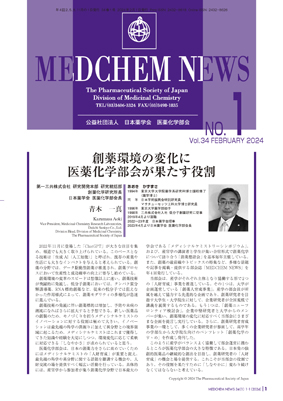Volume 33, Issue 1
Displaying 1-16 of 16 articles from this issue
- |<
- <
- 1
- >
- >|
-
2023 Volume 33 Issue 1 Pages 1
Published: February 01, 2023
Released on J-STAGE: February 01, 2023
Download PDF (602K)
-
2023 Volume 33 Issue 1 Pages 6-10
Published: February 01, 2023
Released on J-STAGE: February 01, 2023
Download PDF (1934K)
WINDOW
-
2023 Volume 33 Issue 1 Pages 11-15
Published: February 01, 2023
Released on J-STAGE: February 01, 2023
Download PDF (1068K)
ESSAY
-
2023 Volume 33 Issue 1 Pages 16-20
Published: February 01, 2023
Released on J-STAGE: February 01, 2023
Download PDF (1935K)
DISCOVERY
-
2023 Volume 33 Issue 1 Pages 21-27
Published: February 01, 2023
Released on J-STAGE: February 01, 2023
Download PDF (2376K)
SEMINAR
-
2023 Volume 33 Issue 1 Pages 28-32
Published: February 01, 2023
Released on J-STAGE: February 01, 2023
Download PDF (1085K) -
2023 Volume 33 Issue 1 Pages 33-37
Published: February 01, 2023
Released on J-STAGE: February 01, 2023
Download PDF (1620K)
Coffee Break
-
2023 Volume 33 Issue 1 Pages 38
Published: February 01, 2023
Released on J-STAGE: February 01, 2023
Download PDF (708K)
REPORT
-
2023 Volume 33 Issue 1 Pages 39-41
Published: February 01, 2023
Released on J-STAGE: February 01, 2023
Download PDF (1894K)
-
2023 Volume 33 Issue 1 Pages 15
Published: February 01, 2023
Released on J-STAGE: February 01, 2023
Download PDF (599K)
BOOKS
-
2023 Volume 33 Issue 1 Pages 20
Published: February 01, 2023
Released on J-STAGE: February 01, 2023
Download PDF (662K) -
2023 Volume 33 Issue 1 Pages 32
Published: February 01, 2023
Released on J-STAGE: February 01, 2023
Download PDF (699K)
-
2023 Volume 33 Issue 1 Pages 42
Published: February 01, 2023
Released on J-STAGE: February 01, 2023
Download PDF (490K) -
2023 Volume 33 Issue 1 Pages 43-44
Published: February 01, 2023
Released on J-STAGE: February 01, 2023
Download PDF (928K) -
2023 Volume 33 Issue 1 Pages 45
Published: February 01, 2023
Released on J-STAGE: February 01, 2023
Download PDF (541K)
-
2023 Volume 33 Issue 1 Pages 48
Published: February 01, 2023
Released on J-STAGE: February 01, 2023
Download PDF (647K)
- |<
- <
- 1
- >
- >|
